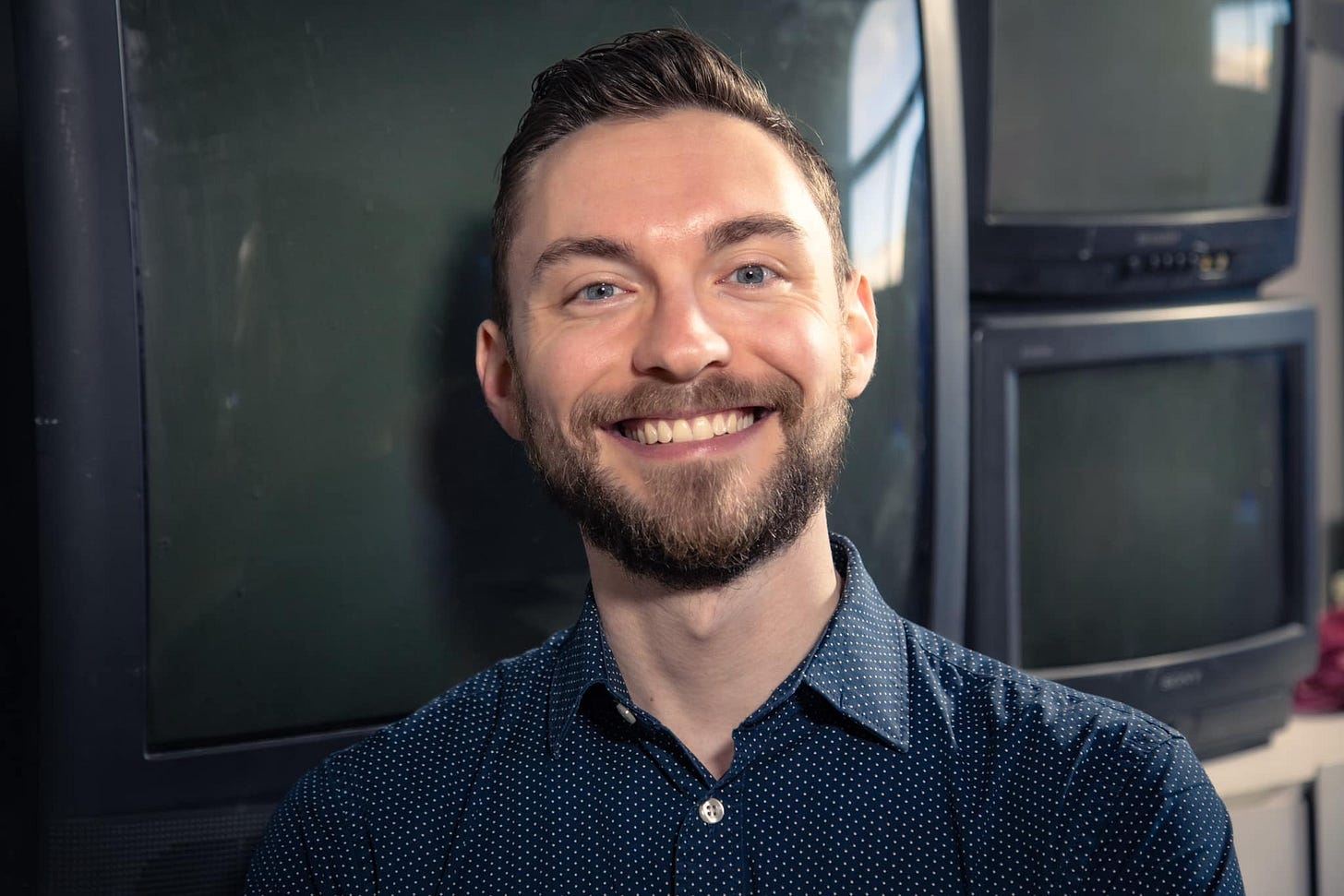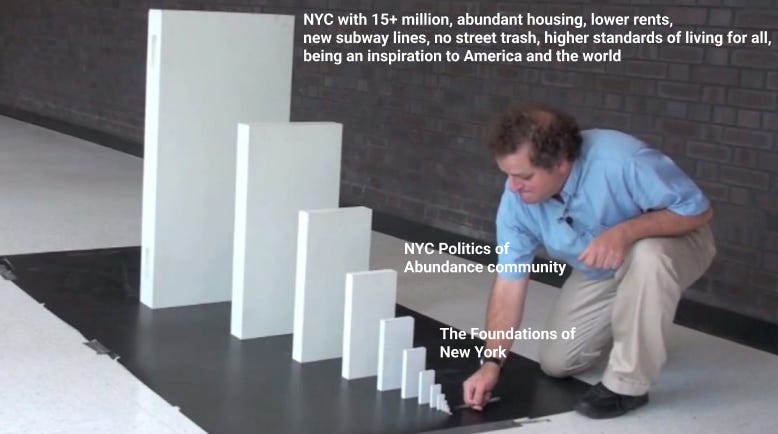The Foundations of New York: Applications Are Open!
Apply to join cohort 8, running from mid-September through mid-November
Summary: I’ll be teaching the eighth cohort of The Foundations of New York, an eleven-week class to give New Yorkers the history, political theory, and political strategy they need to conduct the politics of abundance. Applications ARE OPEN through September 1, but seats are limited—applying sooner is better.
Summary details:
Cohort 8 will meet on Monday evening from 6:30-8:30pm, beginning September 11, and ending on November 20. This schedule contains one built-in make-up day. If we do not need it, it will be a voluntary class period.
2-4 hours of reading and homework a week; homework is mandatory.
Class meets in person off Madison Square Park; location could change depending on enrollment.
Tuition on a sliding scale of $0-2,000 if your application is accepted.
CONTENTS:
The Politics of Abundance
The Foundations of New York: Class Structure & Information
Class Expectations and Etiquette
About Your Instructor
Class Syllabus
New York City and the Politics of Abundance
The Foundations of New York is an 11-week class that teaches you the political history, status quo, and strategy needed for New York City to build. If you want the city to have better governance, more housing, new transit, and for it to reclaim its proper title as capital of the world, this class will give you what you need to make that a reality: a basic knowledge context that allows you to explore and operate independently in the political realm, and a social group of people who want the same thing.
The principal problem in governance across the country, but especially NYC, is that most intelligent, ambitious, kind people stay away from government and politics. Worse than that, they often (incorrectly) think the domain is beyond help.
This has only one inevitable consequence, but it doesn’t have to happen.
The Foundations of New York is a ready on-ramp into politics and the abundant future it could give us. Besides the actual structure of our government and its laws, the class covers the causes of the meta problem of why you, despite wanting the world to be better, don’t know about government and politics:
The anti-politics meme: the unconscious programming most people have that steers them away from politics.
The anti-concreteness meme: the rhetorical habits and cultural defaults that prevent people from understanding government the same way they expect to understand a physical trade, science, or math.
No easy way to learn: politics is as complicated as any STEM field, but you will not readily find easy introductions to it anywhere. Most people only have the option of “figure it out yourself,” with no obvious set of YouTube videos or books to assist them.
A loss of social technology: New Yorkers (and Americans) were not always so helpless and disengaged from their civic order. People accomplished extraordinary things in the civic realm, and you can become one of these people.
As part of this class, you will also learn how to do politics and accomplish your goals. That is to say: you’ll put together your first political capital savings plan!
You are not politically helpless.
Politics is a system, and its results can be beautiful.
Government is the proper place for the good, kind, and rigorous.
Enter the arena.
The Foundations of New York: Class Structure and Information
Applications are open from August 21 until September 1 (5pm EST); they will be accepted on a rolling basis, and sooner is definitely better. The next cohort won’t be offered until Q1 of 2024!
I’ll inform all applicants of their status, successful or not, by September 4 or sooner. I aim to answer each application within a week of its submission.
The details:
Meeting time: class will meet from September 11 through November 20, in person, once a week, for two hours. There will also be optional office hours according to student interest.
Class will meet Mondays, 6:30-8:30pm, off of Madison Square Park. The class location could change depending on student enrollment.
Structure: class will be structured as a seminar, not a lecture.
Class preparation and homework:
There will be readings for each class, small class projects, and a final exam (written and oral) that is graded pass/fail. Plan to allocate at least 2-4 hours a week for this work. Final exams will be scheduled at the class’s convenience, and students are responsible for scheduling their own exams.
You will have to create a Substack blog for this class. Each week’s homework will include one Substack post that will be reviewed by me and any class TAs. While I encourage students to keep their blogs public and share their progress, you can make your blog private too. You must complete all of these assignments to pass the class.
During the 11 weeks of class, you will have to complete at least two “witnessing government” homework assignments. You will attend government meetings and respond to a variety of prompts based on what you witness. There will be evening, weekend, remote, and pre-recorded options. You must complete these two assignments to pass the class.
There will be a graduation party at the end of the class (timing dependent on a variety of factors), and you must pass the final exam to graduate. The class content will prepare you to pass the exam, no cramming necessary.
Class participants will be added to a Maximum New York Discord server, which will be our primary mode of communication for coursework, office hours, and general discussion. There will be a code of conduct you need to accept to join the Discord, similar to the class expectations and etiquette outlined in the next section.
The class is priced on a sliding scale of $0-2,300. If you are accepted into the class, please pay according to your means. The class price is $2,300, but I will ask no questions if you give yourself a scholarship of any size.
And after the course, the real fun of politics begins. It’s an open world.
Class Expectations and Etiquette
The class is open to anyone who wants to improve the capacity of NYC’s government, with an end toward making NYC larger, more wealthy (both absolutely and per capita), more opportunity-rich, and more enjoyable for everyone. If you embrace a politics of abundance (more housing, for example), you are most welcome.
The classroom environment I encourage is one of exploration, curiosity, playfulness, and charity/tolerance; if you have dug-in political ideas, you need to let those go, at least for the duration of the class. We are here to learn how things work first and foremost, although larger questions of political philosophy absolutely come into play at various points. You should think about politics as a systems problem with no perfect solutions, but still plenty of good ones.
This class has two formal rules of etiquette that you must follow:
Politics is a good word, and a potentially beautiful thing. We are here to learn how to do government as friends, in a chill fashion, even while dealing with weighty issues.
No bullshitting, aka be concrete. We’re all here to learn together, but we’re doing it in a rigorous fashion. You must always strive to deeply understand the reality of governance that underpins your political thought.
About Your Instructor
Hello, my name is Daniel Golliher (goll- as in the gall, the nerve, and the audacity; iher- as in how they say “your” where I come from: Gol-yer). I’ve lived in New York City for going on five years. Besides my writing on this website, you can learn more about me on Twitter, and my personal blog. I’ve written a few books, play the piano and sax, enjoy all manner of physical fitness, and can’t wait to meet you.
I graduated from Harvard College in 2014 with a degree in Government1, and since then I’ve worked in the legal industry, a coffee shop, higher ed, the legal industry again, and now I dedicate my time to Maximum New York and the citizens law degree.

Class Syllabus
The Foundations of New York will focus on three broad domains of NYC: history, political theory, and political practice. They’ll all be addressed in an integrated fashion, rather than in sequence or isolation.
History is vital, because it reveals why New York is the way it is. Cities are the product of path dependency and lock-in effects, and you shouldn’t govern if you don’t take these into account, because you’ll be producing them no matter what you do.
Political theory is necessary to inspire and motivate. It examines how government has been formed and revised in the past, and gives us the knowledge about how we might do it again now and in the future.
Political practice, otherwise called political strategy, is the study of how to connect political means to political ends. How to do things, not vaguely bullshit with your friends about what someone should do. Politics is as sophisticated as any science, and we will treat it that way. Some vital components of this field are knowledge of the governing structures of the city themselves, and the political players within them.
History:
The consolidation of New York City in 1898
Why consolidate? Topics from the post-Civil War to 1898 (the case of the Brooklyn Bridge)
Effects of consolidation and the last Mayor of Brooklyn
The consolidated government and the Board of Estimate
Consolidation to WW2: it’s time to build
Subway expansion
The Bronx: an instant city
1916 Zoning Resolution
Skyscrapers!
Urban renewal and the Progressive Era
The Port of New York and New Jersey, 1921
New York City Housing Authority (NYCHA), 1934
1960s: turning points
The Death and Life of Great American Cities, by Jane Jacobs, 1961
1961 Zoning Resolution (!!)
Along comes the Metropolitan Transportation Authority (MTA), 1968
Preservationism: the Landmarks Preservation Commission (LPC), the Landmarks Law, historic districts, the fight to save Carnegie Hall, and the demolition of Pennsylvania Station, 1961-1965
Urban renewal continues: the demolition of Lincoln Square, the rise of Lincoln Center (with a cameo from President Eisenhower), 1955—1969
The 1970s: change and turmoil
The twin towers completed in 1973
The Power Broker in 1974 and the end of Robert Moses (and why this book is tricky)
City bankruptcy of 1975, the intervention of Albany
The charter revisions of 1975, Uniform Land Use Review Procedure (ULURP) and Community Boards
The near-demolition of Grand Central Station (1975-1978); compare to the preservation fights of the previous decade
The blackout of 1977: literal and spiritual
The charter commission of 1989 and Board of Estimate of City of New York v. Morris
The ghosts of Jane Jacobs and Robert Moses, how they haunt the city, and whether to exorcize them
Political theory:
Case studies of creation and revision:
1898 consolidation of NYC and the first city charter
NYC charter revisions of 1975 and 1989
Maximum New York’s political philosophy
The means: social technology to develop and knowledge to acquire
The ends: actualizing higher expectations for New York City, why and how (more wealth, population, and well-being)
Outcompeting the anti-politics meme
What does it look like to “get involved in politics”? Beyond the stereotypically narrow, often incorrect view
Political practice:
The NYC government
Charter, Local Laws, The Rules, Administrative Code
Branches: Mayor, City Council, Comptroller, Public Advocate, Executive Agencies, Borough Presidents, Community Boards/Districts
Budget: Executive and Adopted; Expense, Capital, Contract, and Revenue; dependence on Albany and DC
The boroughs: what do they do?
ULURP: case study on the nature of governmental review and public comment
The city’s external dependencies
The NYS government
The Federal government
Public benefit corporations
MTA
The Port Authority of New York and New Jersey
Various topics in city politics:
The players and their stage
Housing: NYCHA, markets, LPC, and zoning
Transit: why is it the way that it is?
Law enforcement, Rikers, and the NYPD
Political successes in the modern era (it’
Other topics that surface during the course
Good follows, reads, and resources
Twitter
Books
Podcasts
Blogs
Civic Tech




